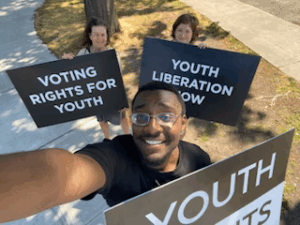 This is part of the Youth Rights 101 series. Please check out Youth Rights 101: Introduction for the rest of the series and more information.
This is part of the Youth Rights 101 series. Please check out Youth Rights 101: Introduction for the rest of the series and more information.
Does youth rights mean thinking children and adults are the same?
No. Obviously there are physical, developmental, and other differences between children and adults. There are also plenty of such differences among adults alone or among same-age children alone. Nor does one stop growing and developing in any meaningful way upon reaching adulthood. These differences do not mean one group is inherently “superior” to another.
The question is just how exactly these developmental differences should affect one’s rights and responsibilities, if at all in some cases. Can you really be “not developed enough” to enjoy free speech rights, for example?
For many, youth rights focuses primarily on teenagers, and teenagers are not children. They are far more similar to adults than to children, and in other times and places are/were considered adults already, yet here and now they are under almost all the same legal and other restrictions as children. What good does this reduced status and compulsory dependence do them, when other people (their adult guardians) have the final word on decisions about them that they are perfectly capable of making on their own?
When dealing with children (let’s say under 12, give or take), of course, issues of development are more likely to come into play, depending on the specific issue and person. Again, of course, this begs the question of whether development or maturity truly matters in some cases and just how much. Generally, the child’s wishes should be taken into account as much as possible, and any coercion should be avoided and any questions should be answered, all as respectfully as possible, since such basic respect is another thing you can’t be “too young” or “not developed enough” for. I can’t get into much more detail than this, since there’s a lot of debate among youth rights supporters and theorists on such rights when it comes to children, but those are the basics anyway.
So, no, we do not think adults, teens, and children are all “the same” per se, but we question how much these differences can justify all the restrictions placed upon the young, and recognize that there’s too much variety in the specific issues and specific people to draw such an age line across the board. And these differences are certainly no excuse to consider the young inferior to adults in any way!
What do you think? What ways, if any, do you believe developmental or other differences between adults and youth do or do not matter when it comes to rights and responsibilities? Tell us in the comments!






“Separate but equal” would be a huge step up for youth. Don’t knock it just because it was a step down for others.
A few reactions:
1. Speaking of ‘developmental differences’ between adults and children is itself problematic in that different children have different capacities at different ages, some of whom exceed the capacities of many or most adults in precisely those areas where adults are said to be more capable.
2. The term “development” must itself be politicized and problematized. It is used as a cudgel to reject demands for children’s rights. Any differences between most children and most adults are viewed as examples of children’s underdevelopment, or adults greater development. The view implied by adopting the language of “development” is that children develop to a higher level once adults, that adults are developed, children, developing. This does not square with the reality however: was inherently imperfect as so-called intelligence tests are, they demonstrate that many areas of human mental capability actually peak in early youth: adults aren’t ‘more developed’, we are all in decline in these measures.
3.Who are these “many” for whom youth rights primarily on teenagers? This implies that there is some large contingent of people who adopt this view, within youth rights. I have not really seen any evidence of that.
4. Only amongst children is lack of capability or capacity thought to logically reduce the ability to refuse intervention and control of others. I am unable to fly a plane competently and as such I should not be licensed to do so, but my lack of flying capability or flying development does not imply that those who can fly planes may abduct me and fly me to locations against my will. This is however exactly what we are asked to believe with children. If we accept that say, a particular 7 year old child is not competent to live on her own (and we might legitimately question if a properly educated 7 year old couldn’t live on her own in reality, if education to do so was provided, if maybe a weekly cleaner or something was provided, if the proper adjustments were made, such as counter heights within her easy reach – the type of adjustments that are necessary for people with certain sorts of disabilities for example.) it does not follow that she shouldn’t be able to choose who she lives with (providing they consent), or that she shouldn’t be able to set her own bed time, to decide what books she reads and what television programs she watches, to decide how much time she spends on the internet, whether she attends church and if so which one, and so forth. Even if a care taker was absolutely necessary (as it very much may be before 4 years old for example) there is no reason why that care taker should have ultimate sovereignty over that child anymore than the caretakers many elderly people rely on are granted powers of them. The differences in development are trotted out as a trump card against those who would liberate children from their current thoroughly dominated status. But this makes no sense.
5. To the extent that relevant developmental differences (that are not accounted for by lack of education that could be provided for example), they should motivate us to adjust public space and social expectations in such a way that accommodates children’s differences, in the same way that we do for disabled people, rather than using it as an excuse to justify continued domination of children.
Different but equal? Like kingnixon, I am reminded of Separate, but Equal. And foxfire, Separate but Equal was not a step down from what African Americans’ status had been, unless you consider it worse than slavery. No, I think that it was a stepping stone, and that it would be for Youth Rights as well. A pacifier, a olive branch tossed our way. But the danger is that we might lose our fire and not push for the rights that we inherited as a birthright.
Yes, I’d admit that it would be a step up from our current state, but frankly, each person is “different” but aren’t they all entitled to the same rights and protection under the law? If we are segregated as different, then it will be very hard to win the same equal rights. Think about it. Right now, aren’t these “developmental differences” used as a reason for why minors ought not have the same rights and privileges as adults?
Furthermore, as SG already stated, each person develops at a different rate. Are we going to have state-mandated brain screenings and psychological testing to determine when we are “mature” enough to enjoy full-fledged rights?